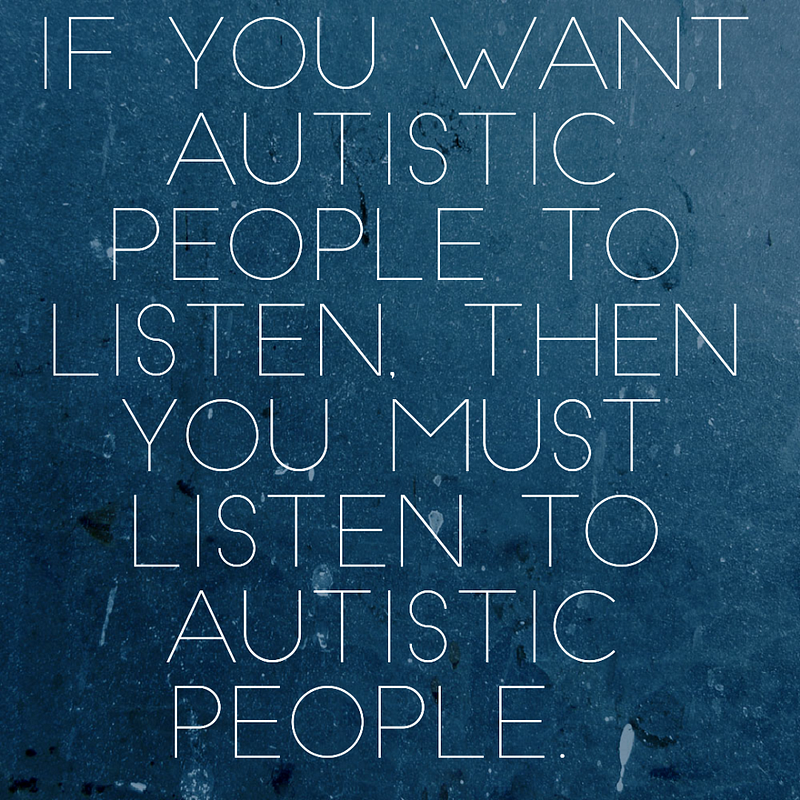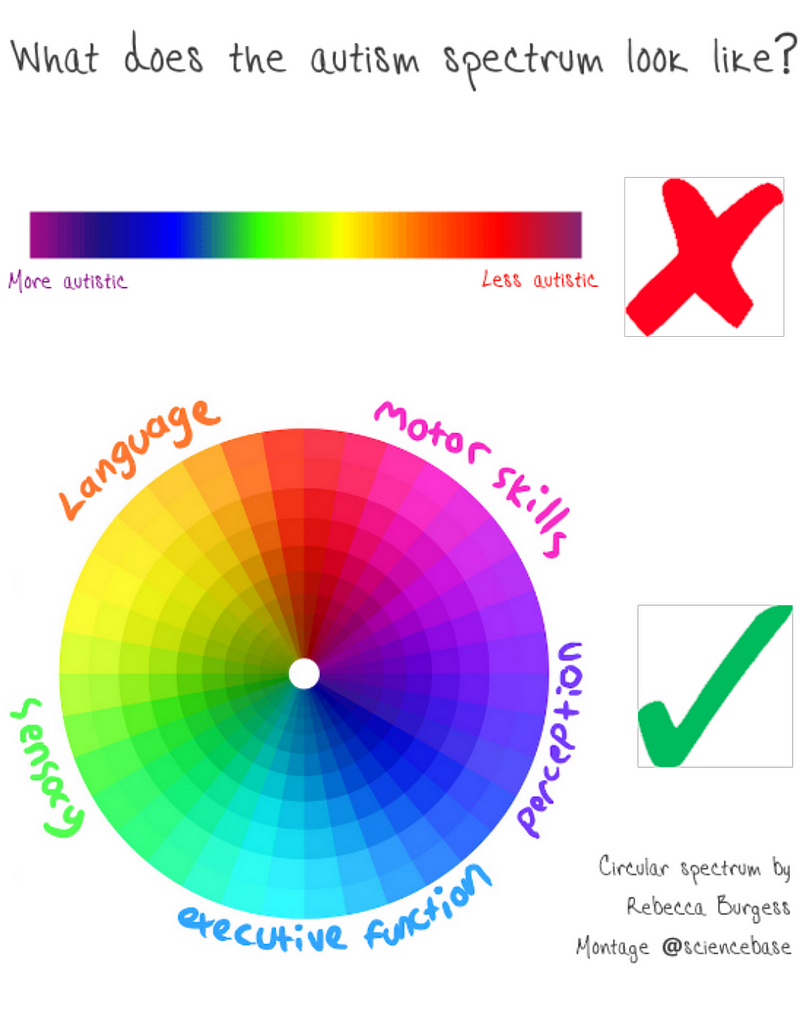UPDATED BLOG POST! ARCHIVE (2017): Autistic and Valid
Autistic and Valid
I am enough…

Autism is a neurodevelopmental disability and a natural variation in the brain. I’ve seen too many people, while advocating for the fact that I’m autistic, use the excuse that I’m not autistic enough, as if my challenges don’t exist. It’s heartbreaking to watch people literally dismiss who I am as a person everyday, because as an activist, I strive for cultural changes and the desire to educate others with good intentions. When those changes don’t take place over time, it can become quite gruesome advocating for myself. I don’t want to have to explain every single challenge I deal with to people, simply because disabled people are always expected to prove themselves when they have neurological differences. This does not mean I am ashamed of my challenges, but deciding to tell someone about a few, and then having those people judge me for the few that have been mentioned is enough for me to see that the person is only looking for physical evidence. The only person who will ever know will be my therapist, and she doesn’t know all of those challenges yet. I’ve seen people tell me all of my life that I look “normal”, and that it’s a good thing that I do. Yet the underlying ableism would say otherwise. I look at how people stigmatize and stereotype autism everyday. I’m not better than anyone who is labeled as “low functioning”. For us, the labels do not make sense. If you’re labeled as “low functioning”, your strengths are not recognized. If you’re labeled as an aspie (asperger’s syndrome) or “high functioning”, then your challenges aren’t seen by others easily. As if I have not lined up my ducks in a row, and if I line up just the few that are left, then you’ll be comfortable. But we’ll never be normal because you can’t get rid of autism. So, therefore, there are days where I am “high functioning” and days where I’m “low functioning”. Here are two examples:
Scenario One:
Kate is in high school, and is not entirely nonverbal, so she does only socialize with a few peers and her family (as well as the faculty/staff that support her). She was put into speech therapy and does not know how to communicate that well, and uses echolalia. She does not use an app to communicate and knows sign language, but rarely uses it. She also uses an emergency chat app (a one way chat system) when she has meltdowns and has meltdowns once a day. Kate is overwhelmed by shutdowns everyday (internal burnouts) and she also struggles in her day-to-day functioning with getting her homework done, waking up, taking care of herself, etc. She also does not like talking to more than two people at a time and cannot handle being around people for too long. She studies during the day when she’s not in class by herself and, also, is avoiding any form of communication with others while she’s studying. Kate has trouble interpreting social situations and easily escapes to a quiet area during the day when she’s incredibly overwhelmed. She struggles with close and not-so-close friendships and other peer-based relationships. Dating anyone is too overwhelming. There are days where she just wants someone to just be around to help her out. Kate is able to receive the social support and help when she needs it. She gets people to speak with her when she is in important meetings, etc. at times. When she deals with change, it’s always too overwhelming. She also rocks, spins, and flaps her arms to stimulate. She uses other techniques for stimming as well. When she’s overloaded with sensory input, she wants to leave the room. She struggles with delayed processing of her thoughts and has to think about every single word that comes out of her mouth because her brain does not think in words naturally. She also is really into music and loves playing percussion, and she sings. Lastly, Kate is persistent about proving what she can do and what she can’t to others. She does point out her own strengths to people, like the fact that she can hear people talking from far away and the fact that she is able to think on her feet at times. Her communication is not terrible, even if others accommodate to her style. They are also more patient around her. She has several other things she can actually do as well, but has to prove those things to people.
Scenario Two:
Zoe is a senior in college. She’s very organized, gets on time to her classes, and studies a lot. She was put into speech therapy and communicates as well as she can, but still struggles with it. She also has successfully managed to maintain her close relationships relatively well. Zoe is an extroverted introvert. She goes to a few parties each semester and loves to socialize with her friends. She also is an activist, and is not afraid to stand her ground. She struggles with communicating in detailed language. She loves to learn and also is pressured to conform. She struggles to hide her meltdowns and shutdowns and does not deal with change that well. She is also struggling in her day to day functioning with how she talks to people and how she takes care of herself. Zoe loves to please others, but also does not sugarcoat things for others. She grew up in an abusive household that did not teach her that mistakes are okay to make and that perfectionism is overrated. Her parents do not see the logic that she tries to see everyday and she struggles to maintain relationships that are too tough to be in. She gets burnout easily from these poor relationships and tries to explain her disability to the folks she is close and not so close with. However, some of them don’t take her seriously enough and she gets quite frustrated easily. Her personality is kind, and respectful and rarely shows an autistic behavior. She hates bright lights and loud noises, and she also cannot handle certain fabrics, or other people touching her without her permission. She has auditory processing disorder and struggles with social interpretations, but also can easily admit to her own mistakes (she knows she isn’t perfect). Lastly, Zoe wants to be hopeful in life but is also too realistic with herself at times. She leaves the room when she has meltdowns and struggles to build up her self-esteem. She sees a clinical therapist. Zoe has struggles like Kate does at times, but has more pressure to hide those struggles than Kate. Zoe wants people to see her for who she is but she’s too naive and people don’t take her seriously when she’s asking for the help, and when she tries to not want to be too independent, people do not want to help her out. but does not get taken seriously because people accuse her of not trying hard enough. She struggles to maintain acceptance over herself and struggles in therapy sessions.
So each of these scenarios are different. You can easily tell which one is “low functioning”, right? If you guessed scenario one, you would be “right”, except for the fact that both of these scenarios are myself put into two different categories. So you are not. Scenario one and two show struggles. There is never really a point where I’m less autistic than someone else. The big message? I struggle with day-to-day functioning everyday, regardless of where I’m at because I’m autistic. I have a hard time trying to be good enough for myself and others every day. We are not less or more autistic than anyone else. Viewing the spectrum as linear is not logical. Functioning labels do not add up because they are not black and white. Here is the way I view the spectrum, on a color wheel (not on a line, because that’s ableist):


The graph and photo explaining above makes more sense, and hopefully that gives you clearer picture. The black dots point to different identifiers for what goes on in our daily functioning, and can vary depending on each person. I am autistic and valid. I do not need other individuals to belittle my existence. When you’ve met one person who is autistic, you’ve only met one person. We do not suffer from autism, but we do suffer from your hate and intolerance. People like to consistently grade our challenges, as if that makes us less or more autistic than the next person. But, that is just as illogical as as saying that you aren’t using your own cognitive functioning as an excuse to say that you are functioning better than us, and that I should just get all my ducks lined up in a row. Please stop the ableism and stop the hate. The more “normal” I appear, the more the other person is satisfied because what we do is not normal to them. The less normal I appear and actually explain what I go through, they’re never satisfied with what I’m saying and don’t take me seriously. I’m not any better than someone who is “low functioning.” Where does one draw the line at what autism is and isn’t? That’s not anyone else’s decision to make. Look at what we can accomplish and what our challenges are without judgement and ignorance. We’re human beings, who are ALL ignorant. Ableism isn’t a singular issue. Systemic privileges are real. We’re ALL racist, sexist, ableist, homophobic/biphobic/panphobic, classist, genderist. White people, like myself, deal with prejudice, not racism. You, there, on the spectrum are valid enough. Anyone on spectrum is valid. We are good enough, regardless of what others say. They cannot speak for us. What this society has taught us autistics is that we are “burdens”, that we have to fix ourselves, and accommodate for others all the time. Behavior will always be a social construct, and those who de-humanize us have a lot to learn about who they are as individuals. We are enough. Don’t let any neurotypical tell you otherwise. We ALL are validly autistic. There is no shame in being autistic. Autism is a natural variance in the brain structure. Meaning, we just have a different cognitive processing system and there is nothing, absolutely wrong with that. Autism is NOT a set of rules about who has more or less challenges. It’s different for each person.
You can’t speak for my child.
You’re right, I can’t. Your child is different than me. But am I autistic myself? Yes. Was I once a child myself? Yes, so please stop trying to compare me to your child. Autistic children should be accepted by their parents. A lot of parents who have autistic children are dehumanizing us because they are trying to fix their child’s autism. Autism is always going to be a part of who we are; not the other way around. If you can’t accept your child, then how will you be able to help your child? By accepting the fact that the ableism is not your fault; however, you can change yourself and unlearn what you were systemically taught.
Not all ABA…..
ABA Therapy is abusive towards those of us on the spectrum. Ivar Lovaas was an ignorant man who was very interested in us, but also was toxic in how we were treated and how he studied us. Modern ABA still fixes behavior. Why teach your child to hide the autism? That is a part of who we are. ABA is toxic to my community.
Autism is a mental illness and a disease! It’s manageable and needs to be cured.
Autism is not a disease nor a mental illness. Vaccines do not cause autism. I can’t manage the way I talk to people. And that’s different than respecting someone. It’s so funny how people demand that we not be so bold when we’re honest, yet people accuse us of not valuing respect. It does not mean we are always right, but it means that, when we set a boundary, you’re not satisfied with that. Do you know the difference between being blunt and being truthful? Being truthful means I sit here and can recognize that I’m not always right, while I still do not sugar coat things for you. I can’t talk in detail. Asking me to communicate better, think faster, suck things up, etc. are all ableist ways of thinking. By doing that, you’re not accepting us. We are respectful, but also very logical. We think literally a lot of the time and always accommodate to vague thinking because that is what you all tend to do and it’s incredibly selfish. You all only want one way of cognitive thinking. How is that fair?
How can I fix myself from this mindset?
Take the things we say seriously. Stop accusing us of being selfish. Learn to accommodate us instead of the other way around. Stop correcting the way we talk to you. Stop trying to fix us and look at yourselves. Meet us in the middle (accommodating each other’s cognition is easier) and you’ll learn to be more open minded. Ask us how you can help us out. Dismiss stigma and stereotypes.
We are valid, period. The more you hurt us, the more you oppress and dehumanize us. We are enough…


Comments
Post a Comment